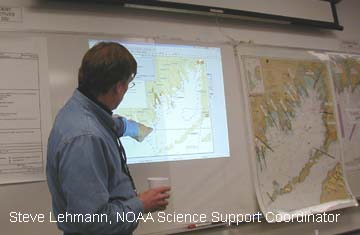Incident Command for the Bouchard Oil Spill in Buzzards Bay
The Bouchard 120 Oil Spill Incident Command System
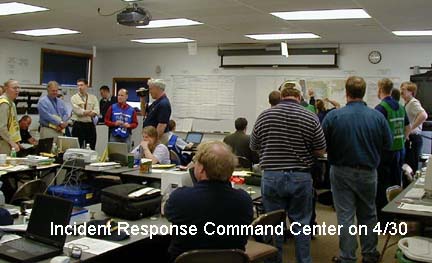
The Incident Command post was originally located at the Coast Guard station at the Massachusetts Military Reservation during the first two weeks of the Bouchard spill. It was then relocated to the Library at the Massachusetts Maritime Academy. In June 18, it opened at its new location in Town of Mattapoisett, on Rt. 6, adjoining, and within the Town Fire Station.
On August 29, 2003, the Command Center was closed. However, residents can were provided a number to call for specific issues related to oil on their property or restoration activity on their property. With the closure of the Incident Command Center, the federal emergency phase of cleanup terminated, but cleanup continued under the start hazardous waste spill laws (see the Cleanup Status page). This cleanup work continued through 2007. Work on the Natural Resource Damage Assessment continued through 2007 as well, and more information on this work can be found on our NRDA page.
Unified Command and the Incident Command System
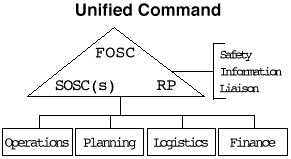
To ensure effective and quick coordination of actions in response to oil spills, the US Coast Guard uses a management system called the Incident Command System (ICS). ICS provides a comprehensive framework to coordinate actions when many agencies and organizations are involved in responding to an emergency. For ICS to work, there has to be a commander who has the authority over all the participating agencies and organizations, and this person is referred to as the Incident Commander.
For some oil spills, the Incident Commander is replaced by several entities that share authority. This new entity is called the Unified Command. One Coast Guard web site describes Unified Command as follows:
In some incidents, including oil spills, there are several organizations that may have shared authority to respond. ICS has the advantage of combining different Federal, State, and Local agencies and the Responsible Party into the same organizational system maximizing coordination of spill response activities and avoiding duplication of efforts. A structure called Unified Command allows the Incident Commander position to be shared among several agencies and organizations that have jurisdiction. In oil spills in the coastal zone, the Unified Command is typically comprised of the Federal On-Scene Coordinator (FOSC), the State On-Scene Coordinator(s)(SOSC), and a Responsible Party representative (RP). This group sets the overall incident objectives and guides and approves the incident action plan. The Unified Command members retain their authority, but work to resolve issues in a cooperative fashion so maximum attention is given to response efforts.
For the Bouchard No. 120 spill, the USCG and Massachusetts DEP are the federal and state coordinators (or commanders). Bouchard (the Responsible Party) is represented by Gallagher Marine, an international marine casualty company that Bouchard hired to clean up the spilled oiled. Many of the staff of the Command Center are employees of Gallagher, or are subcontractors to the company. Others are members of the Coast Guard or state and federal wildlife and environmental agency staff.
As is apparent from the Unified Command System structure described above, decisions are made between the USCG, DEP, and the Responsible Party based upon consensus. All share the common desire of removing spilled oil as quickly as possible, and to minimize damages caused by the oil and cleanup activities. What if no consensus can be made on a particular issue? Both the Coast Guard and DEP have indicated they will require specific actions by the Responsible Party if it meets the cleanup objectives for this spill.
Personnel
Principal personnel in the IC post are as follows:
(Partial List)
Unified Command
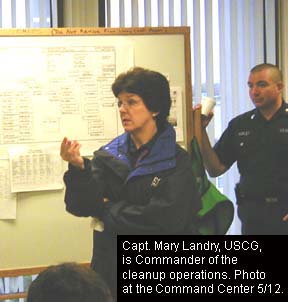
Federal On Scene Coordinator (FOSC): Captain Mary Landry, USCG
Deputy FOSC: CDR Little
State On Scene Coordinator (SOSC): Bob Donovan, MA Department of Environmental Protection (DEP) Deputy Assistant Commissioner
State Deputy SOSC: Rich Packard, DEP
Responsible Party Incident Commander: Dave Barry (Gallagher Marine)
Unified Command Staff
Safety Officer: Brian Gallant
Information Officer: Adrian Durbin
Liason Officer: Lt. Vince Cesario
Planning Section Chief: Tim McKinna
Environmental Unit: Jerry Hall
Demobilization Unit: Pat McGovern
SCAT Coordinator: Dan Crafton
Operation Section Chief: Joe Ledbetter
Wildlife Protection Group Lead: Tom O’Shea
Logistics Section Chief: Ron Johnson
Finance Section Chief: Nancy Gudonis
Documentation Unit: Erin Weber
Compensation Claims Unit: SK1 Cummings
Volunteer Coordinator: Peg Brandon (Buzzards Bay Coalition)
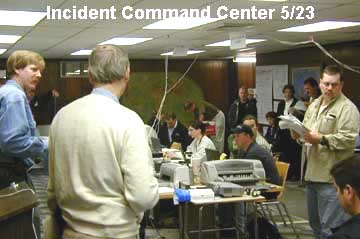
Private Contractors
Besides the myriad of state and federal agencies involved, four private contractors are responsible for key tasks. In some cases, these contractors hire subcontractors for additional tasks.
Gallagher Marine is the international marine casualty and environmental company hired by the Bouchard Company to conduct the cleanup work. Gallagher Marine in turn has hired many of the workers and companies conducting specific tasks.
Clean Harbors is one of the lead companies conducting cleanup actions, and is the Commonwealth of Massachusetts lead contractor in hazardous materials spills.
Entrix Environmental is undertaking environmental assessments and helping ensure environmental objectives are being met.
Tri-State Bird is the lead company cleaning and caring for injured birds. Tri-State trained and utilized a large number of volunteers to help retrieve, clean, and care for oiled birds.
Frank Corp, based in New Bedford, is one of the lead companies in Massachusetts that disposes of toxic and hazardous materials, including spilled oil.
